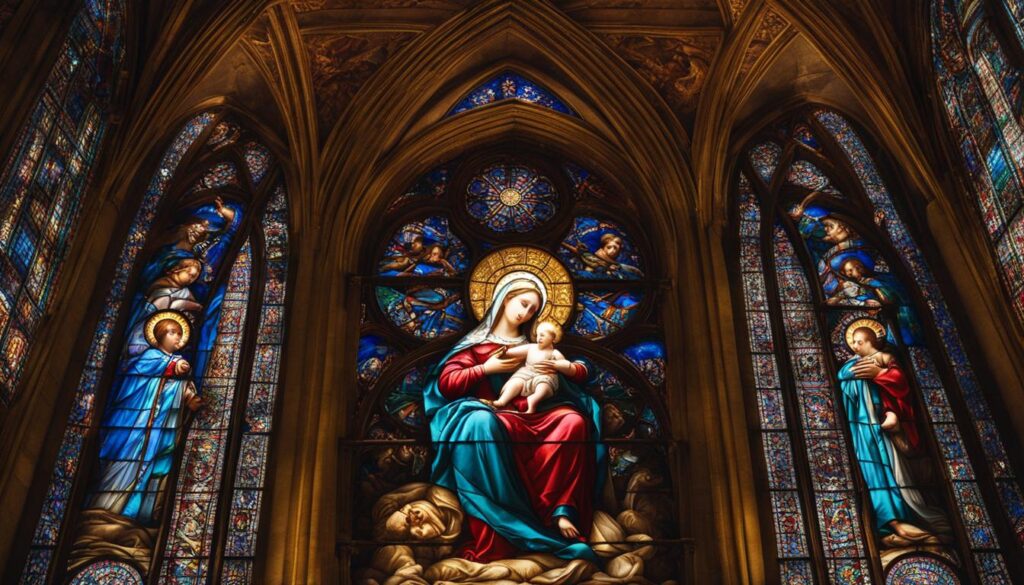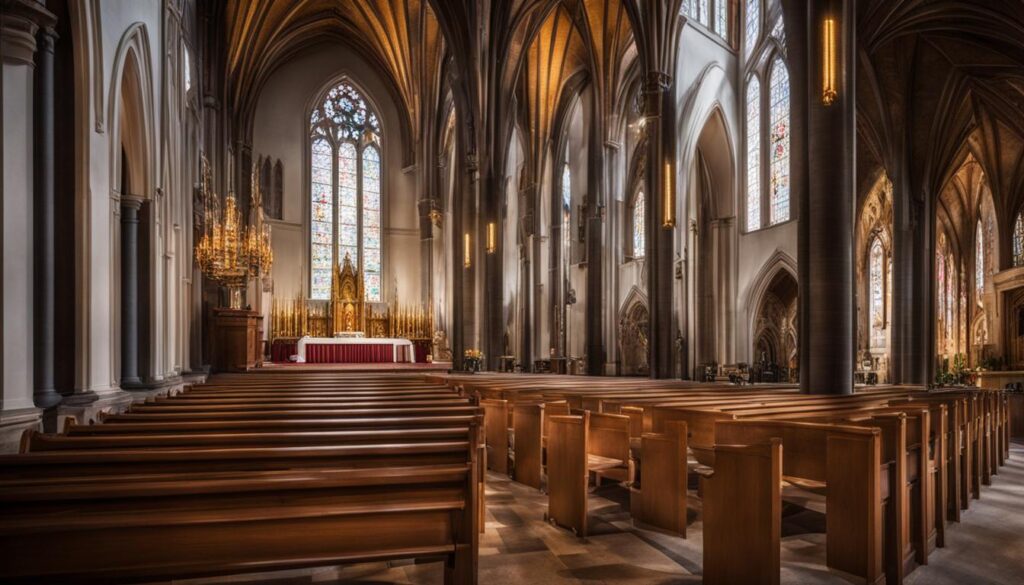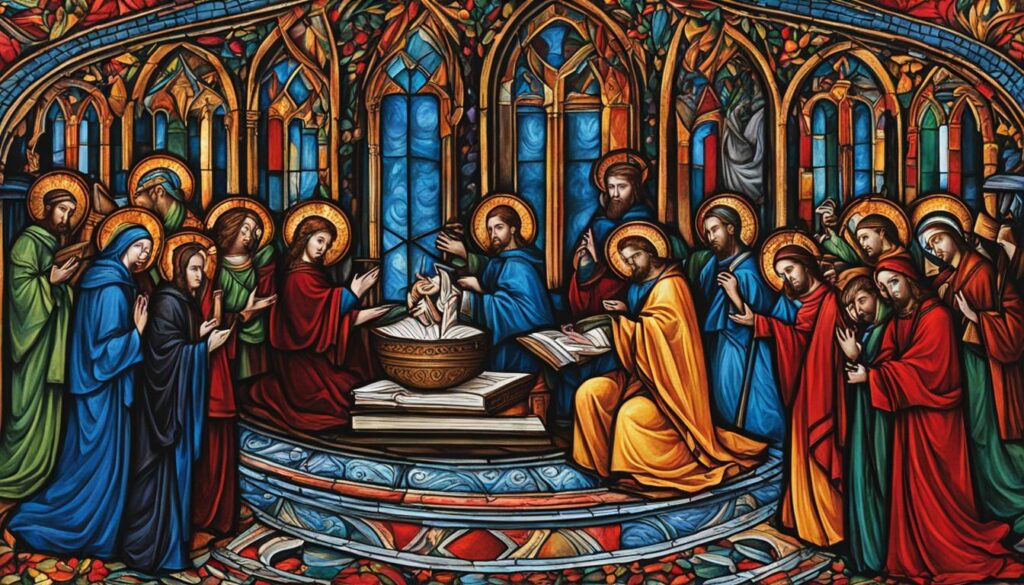Lately, there has been an interesting phenomenon in discussions involving Roman Catholics and Protestants. Protestants often dismiss contributions from Catholics, even on topics unrelated to Catholicism, simply based on doctrinal differences. This raises the question: are Protestants Catholic? Let’s delve into the distinctions and similarities between these two branches of Christianity.
Key Takeaways:
- Protestants and Catholics have significant doctrinal differences.
- Protestants emphasize salvation by grace alone, while Catholics believe in the authority of the Pope and the Church.
- Worship practices differ, with Protestants focusing on preaching and individual interpretation of Scripture, and Catholics incorporating the Mass and traditional rituals.
- Efforts for unity between Protestants and Catholics are being made to bridge the gap and foster understanding.
- Respecting each other’s perspectives and fostering unity within the Christian community should be the goal.
The Origins of Protestantism and Catholicism
The first few centuries of the Christian church saw a unified front in terms of doctrine and church practice. The word ‘catholic’, meaning universal, was commonly used to refer to one church. However, over time, the Catholic Church and Protestant denominations developed their own unique doctrines, traditions, and practices.
Protestantism and Catholicism have distinct origins and theological differences. While Catholicism believes in the authority of the Pope and the Church of Rome, Protestantism places a strong emphasis on salvation by grace alone, through faith alone, in Christ alone. Protestants reject the authority of the Pope and instead believe in the authority of Jesus Christ and Scripture.
Both Protestant and Catholic traditions have evolved over time. Catholic doctrine is rooted in a rich tradition of early church practice, which they consider just as valid as Scripture. On the other hand, Protestant denominations have given weight to the individual interpretation of Scripture and personal relationship with God.
Key points:
- The Christian church initially had a unified front on doctrine and practice.
- Catholicism emphasizes the authority of the Pope and the Church of Rome.
- Protestantism emphasizes salvation by grace alone, through faith alone, in Christ alone.
- Catholic doctrine is rooted in tradition, while Protestant denominations prioritize individual interpretation of Scripture.
Key Beliefs in Protestantism
Protestantism is characterized by several key beliefs that differentiate it from Catholicism. These beliefs form the foundation of Protestant faith and practice, shaping the way Protestants interact with God and understand their relationship with Him.
Salvation by Grace Alone, Through Faith Alone, in Christ Alone
One of the central tenets of Protestantism is the belief in salvation by grace alone, through faith alone, in Christ alone. Protestants emphasize that salvation is a gift from God that cannot be earned or achieved through good works or religious rituals. Instead, they believe that salvation comes through faith in Jesus Christ as the savior and the acceptance of God’s grace.
Authority of Jesus Christ and Scripture
Protestants uphold the authority of Jesus Christ and Scripture as the final authority for faith and practice. They reject the authority of the Pope and view the Bible as the inspired word of God, containing all necessary guidance for salvation and Christian living. This belief emphasizes the importance of personal interpretation of Scripture and individual relationship with God.
Exclusivity of God in Prayer
Protestants focus their prayers solely on God, emphasizing the belief that prayers should be directed to Him alone. Unlike Catholicism, which includes prayers to Mary and other saints, Protestants do not seek intercession from any other entity but God. This belief underscores the Protestant conviction that God is the only mediator between humans and Himself.
Key Beliefs in Catholicism

Catholicism, with its rich history and deep-rooted traditions, holds several key beliefs that set it apart from Protestantism. These beliefs encompass the authority of the Pope, the significance of the Church of Rome, and the belief in the Real Presence of Jesus in the Eucharist.
The Authority of the Pope
One of the central tenets of Catholicism is the recognition of the Pope as the highest authority in matters of faith and morals. Catholics believe that the Pope, as the successor of St. Peter, is the visible head of the universal Church and has the power to define and interpret doctrine.
The Church of Rome
In Catholicism, the Church of Rome holds a special place of significance. Catholics believe that the Church of Rome, under the leadership of the Pope, is the true and unbroken continuation of the apostolic tradition established by Jesus Christ. The Church is seen as the conduit through which Christ manifests his presence and authority in the world.
The Real Presence of Jesus in the Eucharist
Catholics believe in the doctrine of transubstantiation, which teaches that during the celebration of the Eucharist, the bread and wine used in the sacrament become the actual body and blood of Jesus Christ. This belief in the Real Presence emphasizes the spiritual and transformative power of the Eucharist in the lives of believers.
These key beliefs in Catholicism, alongside other doctrines and traditions, shape the faith and practices of Catholic individuals and communities. It is important to note that while there are differences between Protestants and Catholics, understanding and respect for each other’s perspectives can lead to greater unity within the body of Christ.
Worship Practices in Protestantism

When it comes to worship practices, Protestantism has distinct characteristics that set it apart from Catholicism. While there may be variations among different Protestant denominations, there are some commonalities that define Protestant worship.
1. Emphasis on Preaching and Bible Study
In Protestant worship services, preaching and the study of the Bible take center stage. The sermon plays a crucial role in teaching and guiding the congregation. Pastors often deliver messages that explore the meaning and application of Scripture in everyday life. This emphasis on preaching allows for individual interpretation and personal understanding of the Word of God.
2. Incorporation of Contemporary Music and Hymns
Protestant worship services often include a blend of contemporary music and traditional hymns. Through the use of music, worshippers engage in praise and worship, expressing their faith and connecting with God. The choice of music can vary, ranging from lively and energetic songs to reflective and contemplative melodies.
3. Focus on Personal Relationship with God
Protestant worship places great importance on fostering a personal relationship with God. It emphasizes the individual’s direct access to God through prayer and personal reflection. Worshippers are encouraged to develop their own spiritual journey, seeking God’s guidance and presence in their daily lives.
Overall, Protestant worship services aim to create an environment where believers can grow spiritually, strengthen their faith, and deepen their understanding of Scripture. Through preaching, music, and a focus on personal relationship with God, Protestants seek to connect with the divine and experience a meaningful worship experience.
Worship Practices in Catholicism

In Catholicism, worship is a deeply revered and ritualistic experience. The Mass, also known as the Eucharist, lies at the heart of Catholic worship. Catholics believe that during the Mass, the bread and wine transform into the actual body and blood of Christ, a concept known as the Real Presence. This belief is central to their faith and shapes their worship practices.
The liturgy of the Mass follows a highly structured format, with specific prayers, Scripture readings, and rituals performed by priests. Catholics engage in communal worship, participating in the responses and hymns as a congregation. The sign of the cross is commonly used to begin and conclude prayers, serving as a physical gesture of reverence.
Catholics also hold a deep devotion to Mary, the mother of Jesus, and the saints. They believe in the intercession of Mary and the saints, praying to them for guidance and assistance. This devotion is often expressed through prayers and hymns dedicated to these holy figures. Incense may be used to create a sense of sacredness and to symbolize the prayers ascending to heaven.
Key Points:
- Catholic worship centers around the Mass, which is believed to involve the actual presence of Christ in the bread and wine.
- The liturgy of the Mass follows a structured format, with prayers, readings, and rituals performed by priests.
- Catholics have a strong devotion to Mary and the saints, often incorporating prayers and hymns dedicated to them.
- Incense may be used in Catholic worship as a symbol of reverence and to represent prayers ascending to heaven.
The Efforts for Unity between Protestants and Catholics
In recent years, there has been a growing recognition of the need for greater unity between Protestants and Catholics. Despite their theological differences, both groups share a common faith in Jesus Christ and are part of the larger Christian community. Efforts have been made to foster understanding and cooperation between the two, with the goal of bridging the gap and promoting unity within the body of Christ.
One of the key initiatives in this pursuit of unity is through various meetings and retreats. These gatherings provide opportunities for theologians, scholars, and practitioners from both Protestant and Catholic traditions to come together and engage in dialogue. By comparing notes and discussing their respective beliefs and practices, these individuals aim to find common ground and build mutual understanding.
Another important aspect of the efforts for unity is the recognition of the similarities between Protestants and Catholics. While there are doctrinal and liturgical differences, both traditions are rooted in the historic Christian faith and share a common foundation. By highlighting these shared beliefs and traditions, proponents of unity hope to foster a sense of camaraderie and cooperation between the two groups.
Areas of potential unity:
- Worship: Both Protestants and Catholics place a significant emphasis on worshiping God and seeking His presence. While their worship practices may differ, there are areas of overlap, such as the use of hymns and prayers. Recognizing these commonalities can help foster a sense of unity in worship.
- Social Justice: Both Protestants and Catholics are actively involved in advocating for social justice issues, such as poverty alleviation, human rights, and environmental stewardship. By collaborating on these important issues, they can work towards a common goal and make a greater impact on society.
- Christian Education: The importance of Christian education is valued in both Protestant and Catholic traditions. By sharing resources, expertise, and best practices, they can enhance their educational programs and equip believers with a solid foundation in the faith.
In conclusion, the efforts for unity between Protestants and Catholics are driven by a desire to promote understanding, cooperation, and a sense of shared purpose. While acknowledging their theological differences, proponents of unity recognize the importance of focusing on commonalities and fostering a spirit of respect and collaboration. By working together, Protestants and Catholics can build bridges, overcome misconceptions, and contribute to the greater unity of the body of Christ.
Conclusion
As we have explored the differences between Protestants and Catholics, it is important to remember that both groups share a common belief in Jesus Christ and form part of the broader Christian community.
While their doctrinal positions may vary, it is crucial to approach discussions and interactions with understanding and respect for one another’s perspectives. Instead of perpetuating division and misconceptions, the aim should be to foster unity within the body of Christ.
Efforts have been made in recent years to bridge the gap between Protestants and Catholics, with theologians and scholars highlighting the similarities they share. These endeavors seek to promote greater understanding and cooperation, recognizing that both groups are guided by a sincere faith in Jesus Christ.
Ultimately, the question of whether Protestants are Catholic depends on how one defines the term “Catholic.” While Protestants do not adhere to all the doctrines and traditions of the Catholic Church, they are part of a wider Christian tradition that traces its roots back to the early centuries of the Church. Through open dialogue and mutual respect, we can move towards a greater appreciation of one another’s faith and work together to advance the message of Christ’s love and salvation.
FAQ
Are Protestants considered Catholic?
No, Protestants are not considered Catholic. While both Protestants and Catholics are part of the larger Christian community, they have distinct doctrinal and theological differences that separate them.
What are the main differences between Protestants and Catholics?
The main differences between Protestants and Catholics lie in their beliefs and practices. Protestants emphasize salvation by grace alone, through faith alone, in Christ alone, while Catholics place importance on the authority of the Pope and the Church of Rome.
What are the key beliefs in Protestantism?
Protestantism places a strong emphasis on the authority of Jesus Christ and Scripture. They reject the authority of the Pope and focus their prayers solely on God. Protestants also believe in salvation by grace alone and the importance of personal relationship with God.
What are the key beliefs in Catholicism?
Catholicism believes in the authority of the Pope and the Church of Rome. They view the Church as the conduit through which Christ manifests his presence and authority. Catholics also hold beliefs such as the Real Presence of Jesus in the Eucharist and the intercession of Mary and the saints.
What are the worship practices in Protestantism?
Protestant worship services often focus on preaching and the study of the Bible. They may incorporate contemporary music, hymns, and prayers. The emphasis is on personal relationship with God and individual interpretation of Scripture.
What are the worship practices in Catholicism?
Catholic worship services involve the celebration of the Eucharist, or Mass, which Catholics believe is the actual presence of Christ. The liturgy is highly structured and includes prayers, Scripture readings, and rituals such as the sign of the cross and the use of incense. Catholics also have a strong devotion to Mary and the saints.
What efforts have been made to foster unity between Protestants and Catholics?
In recent years, there have been meetings and retreats held to compare notes and find common ground between Protestants and Catholics. Some theologians and scholars argue that there are more similarities than differences between the two groups and seek to bridge the gap.

